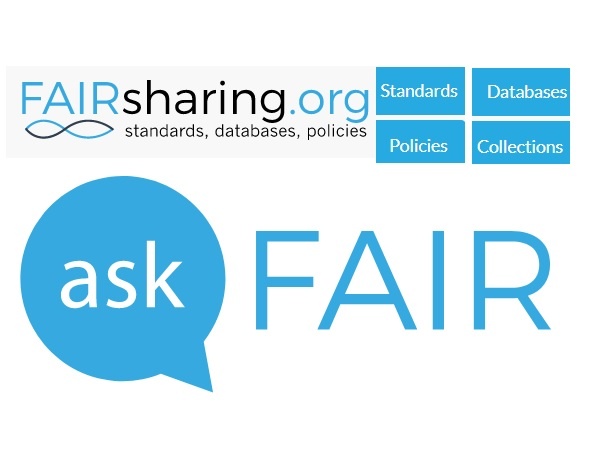BioSharing is now FAIRsharing ! Discover and add Standards, Databases and Policies
13/07/2017


From its first incarnation, BioSharing.org - which focused on the life sciences - has grown into FAIRsharing.org, to serve (through interconencted standards, databases/repositories and data policies) users across all disciplines. Go to FAIRsharing.org - to discover what it's all about ... The rebranding is now complete !
_________________________________________________________________________________________________
# Which resources (standards and databases) are the most relevant for specific domain and needs of different consumers?
# Is your standard or database is findable by prospective users, and recommended in data policies by funders, journals and other organizations?
|
"There is an urgent need to improve the infrastructure supporting the reuse of scholarly data. A diverse set of stakeholders-representing academia, industry, funding agencies, and scholarly publishers-have come together to design and jointly endorse a concise and measureable set of principles that we refer to as the FAIR Principles. The intent is that these may act as a guideline for those wishing to enhance the reusability of their data holdings", - The FAIR Guiding Principles for scientific data management and stewardship (Free PMC Article, 2016). |
While making information resources findable and accessible (the core of the FAIR Principles) and being approved by the ELIXIR UK Node (as part of the ELIXIR interoperability platform for integration of data and services) ... since 2011, the BioSharing portal has:
- gained 60,000+ users and
- been endorsed by a community of about 70 organizations, including publishers (embedded in the data policies of 600 Springer Nature’s journals, also PloS, EMBO press, BMJ, F1000Research, BioMedCentral, Oxford University Press, Wellcome Open Research), standardization groups, and research data management support initiatives and libraries (such as those at JISC, Stanford, Cambridge and the Oxford).
|
"All links to BioSharing or records in BioSharing will automatically redirect to the FAIRsharing site", - FORCE11-RDA FAIRSHARING WORKING GROUP |
FAIRsharing.org : ALL ON ONE PAGE
Considering that across the research disciplines there is a prolifiration of thousands of standards and several thousand databases
|
designed to assist the virtuous data cycle : from collection to annotation, through preservation and publication to subsequent sharing and reuse, |
users would likely need a comprehensive informative and educational resource of interconencted standards, databases and data policies that they could get 'all on one page'...
By 'picking up the baton' from BioSharing.org, FAIRsharing.org offers:
(1.) an expanded range of (both in-house and crowdsourced manually) curated, informative and educational interlinked resources on data and metadata standards (terminologies, formats and models, and reporting guidelines), across all disciplines, inter-related to databases and data policies,
(2.) more user-friendly functionalities and many new features [e.g., Search Wizard / Let us guide you to your results, Avanced Search / Fine grained control over your search].
|
# As of July 2017, FAIRsharing includes : 682 Standards, 938 Databases, 97 Policies, combined with an integrated view across all three types of resource. Every record in FAIRsharing is designed to be interlinked, providing a detailed description not only on the resource itself, but also on its relations with infrastructures across a range of disciplines. |
While cultivating a growing community, FAIRsharing aims at serving a variety of stakeholders, to which it offers diverse benefits:
- to navigate the metadata landscape - for funding bodies and journal publishers - ;
- as an educational resource - for librarians, data curators and information advisors;
- as an advertising platform - for standard and database developers/curators;
- as a tool for researchers, and other stakeholders - to plan their work.
Adding and Claiming content in FAIRsharing
By registering your resource on FAIRsharing you not only gain credit for your work, but you increase its visibility outside of your direct domain, so reducing the potential for unnecessary reinvention and proliferation of standards and databases.
FAIRsharing.org aims at harnessesing cross-community-led curation to collate and cross-reference information resources from around the world.
_________________________________________________________________________________________________
Related:
- RDA BioSharing Registry and RDA Wheat Data Interoperability Guidelines
- The RDA-BioSharing Registry: connecting data policies, standards & databases in life sciences WG is a joint effort with Force11 and it is led and constituted by prospective adopters as well as technical implementers, many of whom are also leading and/or actively involved in other relevant RDA Interest Groups and RDA Working Groups whose activities this WG complements and with which this WG will work closely.
- [PDF] RDA-BioSharing WG report (draft) - a summary of the problems the WG addresses and their context, along with a description of the WG outputs.
- ELIXIR’s platforms: Training - Interoperability & Standards - Data, and Tools
- 26 July : Webinar : FAIRdata Community Session
- 10 marine Research Data Things: a Free self-paced Learning Program
- The main outcomes of the BlueBRIDGE April workshop “FAIR Friendly Research Data Catalogue: how far are we?” are now available in this Report
- EUDAT Semantics Working Group : linking data resources stored in EUDAT with the scientific concepts describing them allows for better data interoperability within the considered scientific domain as well as for efficient data retrieval based on familiar terms for the scientists.
- Data standards can boost metabolomics research, and if there is a will, there is a way (Free PMC Article, 2016)
- Semantic Business Concepts Model from DATA FOOD CONSORTIUM
- International Society for Biocuration
